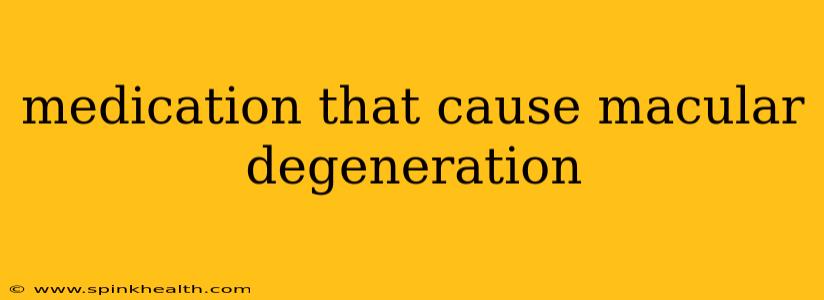The Unexpected Link: Medications and Macular Degeneration
Macular degeneration, a leading cause of vision loss in older adults, often feels like a silent thief, gradually stealing away the sharp details of the world around us. While age and genetics play significant roles, recent research increasingly points to a surprising culprit: certain medications. This isn't to say that taking prescribed medication guarantees macular degeneration, but understanding the potential link is crucial for informed discussions with your doctor and proactive eye health management. My journey into understanding this connection started with a personal experience...
My grandmother, a vibrant woman who loved tending her garden and painting, experienced a slow but noticeable decline in her central vision. After countless tests and consultations, she was diagnosed with age-related macular degeneration (AMD). While genetic predisposition played a role in her case, her doctor also meticulously reviewed her medication list, a process that sparked my interest in the connection between drugs and this debilitating condition. This article explores that very connection, revealing some of the medications associated with an increased risk and addressing common questions surrounding this complex relationship.
What are the medications linked to macular degeneration?
While research is ongoing, certain medications have been associated with an increased risk of developing or worsening AMD. These include:
-
Certain cardiovascular medications: Some studies suggest a link between the use of certain antihypertensive drugs (blood pressure medications), particularly thiazide diuretics, and an increased risk of AMD. This doesn’t mean you should stop taking your prescribed medication; instead, open a dialogue with your doctor about potential alternatives or monitoring strategies.
-
Chloroquine and Hydroxychloroquine: These medications, used primarily to treat malaria and autoimmune diseases like lupus, have been linked to a rare but serious type of macular degeneration known as chloroquine retinopathy. This condition can cause irreversible vision loss, highlighting the importance of regular eye exams for individuals taking these drugs.
-
Tamoxifen: This medication, often used in breast cancer treatment, has also been associated with an increased risk of AMD in some studies. However, the benefits of Tamoxifen in cancer treatment often outweigh the potential risks of macular degeneration, making careful monitoring crucial.
Can medication cause macular degeneration?
It's essential to clarify that medications rarely cause macular degeneration in the direct sense. Instead, certain medications may increase the risk of developing or worsening the condition, likely through different mechanisms. For instance, some medications may impact blood flow to the macula, or interfere with the delicate balance of nutrients and antioxidants crucial for macular health. This is why regular eye examinations are crucial, especially if you're taking any medication on the potentially linked list.
What about other medications?
The research into medication and AMD is ongoing. While the medications listed above have shown the strongest association, other drugs are under investigation for potential links. Always be transparent with your ophthalmologist and primary care physician about all medications you're taking – prescription, over-the-counter, and supplements.
How can I protect my vision while taking necessary medications?
Maintaining a healthy lifestyle is paramount for eye health, regardless of medication use. This involves:
- Regular eye exams: Early detection is key for managing AMD and mitigating potential vision loss.
- Healthy diet: A diet rich in antioxidants and lutein, found in leafy green vegetables, is crucial.
- Quit smoking: Smoking significantly increases the risk of AMD.
- Sun protection: Wear sunglasses that block UV rays to protect your eyes from sun damage.
- Open communication with your doctor: Discuss any concerns you have about your medication and eye health.
What are the symptoms of medication-induced macular degeneration?
The symptoms of medication-induced macular degeneration are often similar to those of age-related macular degeneration. These include:
- Blurred vision
- Difficulty seeing fine details
- Straight lines appearing wavy or distorted
- A blind spot in the center of your vision
If you experience any of these symptoms, particularly if you are taking medications listed above, seek immediate medical attention.
In conclusion: The relationship between certain medications and macular degeneration is complex and requires further research. However, the existing evidence underscores the importance of open communication with your healthcare providers and proactive steps to safeguard your eye health. By working closely with your doctor and ophthalmologist, you can make informed decisions to minimize risks and preserve your precious vision for years to come. Remember, knowledge is power, and understanding this connection empowers you to take control of your eye health journey.

